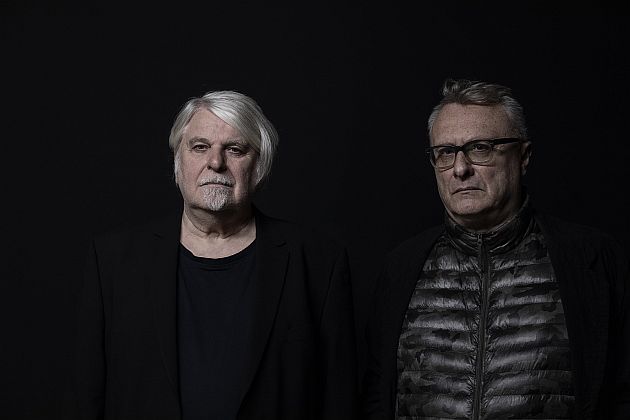 Interview with
Interview withRalf Dörper and Michael Mertens from Propaganda
Forty years since their inception and nearly two decades since their last release, the iconic Art-Synth band PROPAGANDA is back with a self-titled album that embodies the depth and drama of their early work while exploring fresh sounds and styles. Ralf Dörper and Michael Mertens, the principal songwriting duo, have crafted this album entirely in their native Düsseldorf, reflecting both personal and societal changes since their previous release. With guest appearances from acclaimed artists like HAUSCHKA and THUNDER BAE, PROPAGANDA stays true to its roots while evolving its sound.
Tracks like ‘They Call Me Nocebo’ and ‘Purveyor Of Pleasure’ blend vintage PROPAGANDA with modern electronic influences, while the album’s cinematic grandeur shines through in songs like ‘Vicious Circle’ and ‘Dystopian Waltz’. This is not just an album but an immersive experience, designed to be played from start to finish, with artwork and packaging that deepen the understanding of its themes. Released on BUERAU B PROPAGANDA marks a triumphant return for the band, proving that their music remains as powerful and relevant as ever… With Ralf Dörper and Michael Mertens about balance in embracing new influences while staying true to their origins, resistance to nostalgia, collaboration with new vocalist Thunder Bae, and the importance of their Düsseldorf roots in shaping their latest work. And more!
Reflections of Darkness [RoD]: PROPAGANDA’s journey has been one of evolution, from your early days with ZTT to now. How do you navigate maintaining your core identity as a project while embracing new influences and adapting to the ever-changing music landscape?
Ralf: I am reluctant - and always was - to call PROPAGANDA a band. It is a project with an often-changing look (and personnel). But at the core is the songwriting partnership of Dörper / Mertens, which was established back in 1983 and which we revived a few years ago after a long hiatus.
Michael: Forty years on, we are still the people we once were. Changed, of course, but we are still us. We perceive the world around us and get influenced by it. It’s a natural process.
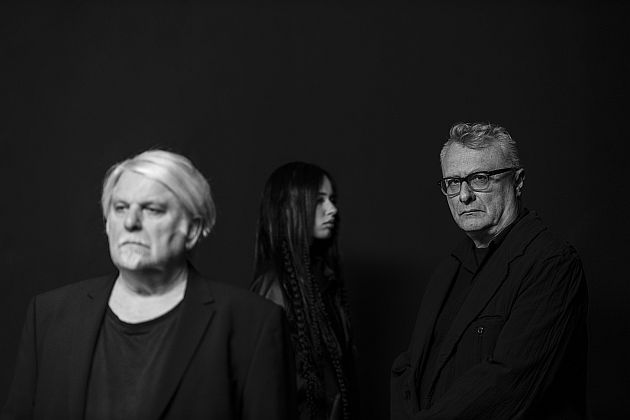
RoD: You’ve expressed resistance to the concept of “retro” and revisiting past successes. How do you balance the pressure from fans and the music industry to relive the 80s with your desire to push forward creatively?
Ralf: Part of the chorus of our first hit single ‘Dr. Mabuse’ is the line: “never look back”. That is the gospel. I don’t mind revisiting old compositions and reworking them. Actually, on our new album, you will find a new version of ‘Vicious Circle’, which was on ‘1234’, the album released by Virgin Records in 1990. And I enjoy bands like FRONT 242 or NITZER EBB (or in the Pop context, HEAVEN 17) playing old songs in new arrangements. What I despise is the lazy way some bands on the retro pop circuit use old backing tapes to present nostalgic sounds to nostalgic people. I believe real PROPAGANDA fans share my attitude. And with regard to the industry: yes, even ten, fifteen years ago, there were bookers keen to have PROPAGANDA on their posters. It has become a trademark - but going on stage, waving, and hopping around to our major hits for twenty minutes and cashing in - that’s circus, or even another word that begins with “p”.
Michael: Everyone’s time is limited. We prefer to test out our possibilities and embrace change rather than looking back.
RoD: Thunder Bae’s involvement in your new album appears to have been serendipitous rather than strategic. What do you believe her presence brings to the PROPAGANDA legacy, and how does her different background influence the project’s current sound?
Ralf: When we started this new chapter of PROPAGANDA, we played with the idea of using different voices for different songs - similar to how MASSIVE ATTACK, NOUVELLE VAGUE, or RÖYKSOPP operate. However, we were lucky that Thunder was one of those voices and proved to be a perfect fit for every song we tried with her. So, in the good tradition of changing times and changing voices, the third album of PROPAGANDA features the third singer.
Michael: I had to google “serendipitous”. Yes, a lucky accident. She is knowledgeable about music and other things. She knows what a Phrygian scale is and correctly pointed it out when she heard me using it. That is rather pleasant. Natalie sings from deeply within, and it’s important to her to get it right. I have a lot of respect for her. The fact that she comes from a different generation and writes her own music makes her even more of a treasure. She is leaving her mark, no doubt.
RoD: Your music has always had a cinematic quality, with references to filmmakers like David Lynch and Fritz Lang. How does the intersection of visual storytelling and music continue to shape Propaganda’s creative direction, especially on this new album?
Ralf: I often write words with plenty of references, some of them to movies. For example, the beginning of ‘P-Machinery’ goes: “on joyless lanes” ...that line refers to the German silent movie “Die freudlose Gasse”. Michael has done a lot of soundtrack work for TV and film in the past decades. So cinematic quality might be our forte and USP.
Michael: I had a music teacher in Berlin who told me, “Michael, you perceive everything in a very visual way.” Trying to learn about music, I wasn’t sure if that was a compliment, since he didn’t mention my ears. But I guess he was right.
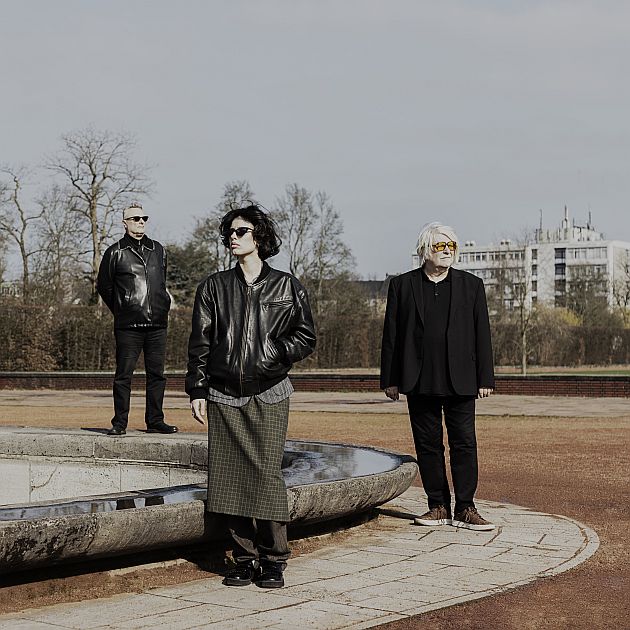
RoD: Given your history with ZTT and the conflicts that arose, what lessons did you carry forward into your new partnership with Bureau B, and how has this new label environment allowed you to explore your artistic vision more freely?
Ralf: When we were part of the Pop machinery, first signed in England to ZTT Records and later to Virgin Records, we were an investment for these labels who expected a return no matter what. So, there were business conflicts from the outside. Success, fame, adoration - ex and drugs and top of the pops? - make people change. Since then, I have released plenty of records on plenty of different labels - and Michael even had his own label for a while. But it’s important to note that nowadays we have no Pop agenda. We use our creativity “and” money, and yes, we want a certain return as well. Bureau B is a good partner who understands our needs and is a home of electronic music. So, we are in good company with artists ranging from Karl BARTOS and PYROLATOR to Conrad SCHNITZLER and MARTIN REV.
Michael: Impossible to draw a comparison. With ZTT, we were naive kids who understood very little. Bureau B only came in once our record was more or less finished. There is no big money in this business anymore, but the people are great, and since we are not legally entangled with them on a larger scale, the general sense of the communication is of a family-like consent.
RoD: With the inclusion of tracks like ‘Wenn Ich Mir Was Wünschen Dürfte’, there seems to be a thematic nod to ‘A Secret Wish’. How does revisiting or referencing past work inform the new album without falling into the “retro” trap you’re keen to avoid?
Ralf: Nothing retro here, just a smart reference. Let me explain: We end the album with that nearly 100-year-old song by Friedrich Hollaender, which follows the instrumental ‘Dystopian Waltz’. Earlier on, I placed some words from that song directly in the waltz, words that have been significant for me since I heard them sung for the first time (in the movie ‘Night Porter’, by the way - I do not recall if Charlotte Rampling was lip-synching to Marlene Dietrich or singing herself). The title of our first album, ‘A Secret Wish’, is a quote from ‘P-Machinery’, and since then, we’ve always been asked about our secret wishes. The English translation of ‘Wenn Ich Mir Was Wünschen Dürfte’ is: “If I had a wish”. I think that song gives’Dystopian Waltz’. So, that is a nod, not a revisit.
Michael: Making a reference to our earlier work does not necessarily make it retro. It’s a playful thought of a bracket - contextual wordplay.
RoD: Your mention of the “Düsseldorf connection” and collaborations with artists like HAUSCHKA suggests a strong local influence. How important is it for you to stay rooted in the cultural and musical heritage of Düsseldorf, and how does it manifest in your latest work?
Ralf: On the record sleeve, you will read “conceived and accomplished in Düsseldorf”, which is a matter of fact but also a statement. Our early records were both conceived, to a certain extent, in Düsseldorf but finished off in England, recorded in state-of-the-art studios with big-name producers: Trevor Horn, Steve Lipson, Ian Stanley, Chris Hughes - and marketed in a very UK style. This time, we step by step reduced the international input we initially considered - guest singers, musicians - a process also triggered by COVID. In the end, we realized that we had access to all we needed right at our door. And regarding the participation of HAUSCHKA, we did not invite an Oscar winner but Michael’s old acquaintance. We also would have liked to have asked FLORIAN SCHNEIDER, but - too late. PROPAGANDA always was conscious of its Düsseldorf origin, and the new album reflects this not only in the musical content but also in the artwork, photos, and design, all done by Düsseldorfers.
Michael: It was important to show that the fundamentals of what PROPAGANDA’s music always defined were not all coming from the big producer, the amazing recording studio, and the well-appreciated, highly paid studio guests. Of course, they were important. No doubt, ‘A Secret Wish’ would have never seen the light of day without the Horns and Lipsons of this world. But it’s easy to overlook that there is still a core of poetic and musical creation that is not coming from the outside. Of course, our ideas were unrefined and partly only fragments of complete works. Nevertheless, it was still Dörper / Mertens who wrote the main body of the thing. Now, we did another PROPAGANDA record written by Dörper and Mertens, without any big guns. The fundamentals are intact.
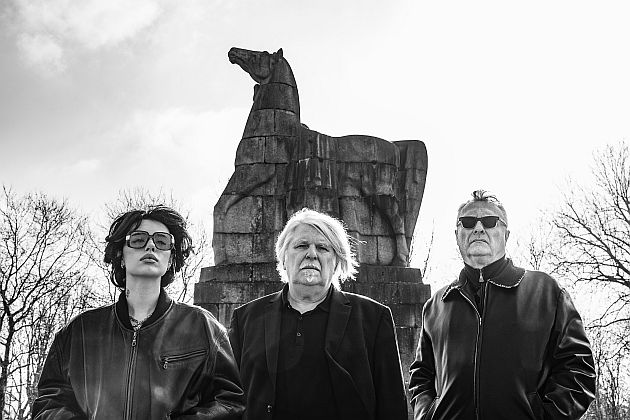
RoD: In the past, you’ve referred to PROPAGANDA as “ABBA on acid”. How do you reconcile that dark, provocative image with the realities of being artists in 2024 , particularly in an era where cultural and social sensitivity is at an all-time high?
Ralf: We weren’t really self-referential. I recall that a journalist coined the term “ABBA from Hell” because we used the Pop package to transport themes from the dark side, which was pretty unusual at that time. But the ABBA line-up was our strategic move (we were 5, not 4, at that time) and we established that as soon as it was clear that we would work with Trevor Horn - or better, vice versa. I consider this 2 boys, 2 girls line-up to be “the” Pop blueprint, constantly adapting to the zeitgeist since the conservative Swedish format (two happy married couples) was finished. In the 70s, there were ABBA, parts of the 80s it was PROPAGANDA, in the 90s ACE OF BASE, 00s LADYTRON... not sure about now? ACTORS?
Michael: It was just a label, something the media could play with. I only know of one person in Propaganda who ever took real acid. Some of the social sensitivities go way too far. I do not want to live in a totalitarian democracy.
RoD: The spat with XPROPAGANDA is hard to ignore. Given that both sides have continued making music, do you see any potential for reconciliation or collaboration in the future, or has that chapter closed definitively?
Ralf: A spat? Not sure if your readers know who xP... are. It’s the vocalists of early 80s PROPAGANDA, who had played the retro circuit as DUEL for a few years until they decided to use xP... as their name. We did not take legal action this time. Let me draw your attention to a book on LAIBACH, ‘Gesamtkunstwerk’. I contributed a chapter, ‘Pop Total, Totaler Pop, Totalitärer Pop’, in which I tell a little story that took place around 2014. I attended a LAIBACH concert in London with the two former PROPAGANDA vocalists and tried to explain to them how I would conduct a PROPAGANDA live reunion 30 years after the Pop years - Licht und Schatten (light and shadow), some basic theatrical elements. For example, not having the singer in the spotlight when they aren’t active, no silly dances, waving, etc. A few years later, they danced and waved to the 80s backing tapes. I haven’t seen them since, but I nearly would have met them earlier this year when they were also booked for a festival in Spain that was going to be headlined by DIE KRUPPS. But we had to cancel.
Michael: Maybe, who knows. I doubt Ralf can see that. But to me, that schism is just one tear in a bucket, fuck it. But it’s Thunder Bae who now rules the day and the microphone. And by the way, we have a very stress-free and creative social interaction. It’s fun to make music together, no obsession with fame or any of that shit. That’s also what it’s about, isn’t it? Maybe we will do a big P show together one day. Who knows.
RoD: Your work has always explored themes of tension - whether it’s the personal tension between members or societal tensions. How do these underlying conflicts shape your music, and do you see resolution as part of PROPAGANDA’s narrative, or is the tension itself the driving force?
Ralf: Not sure if I could agree with this as what inspires my work. I will leave that open to interpretation. But without tension, you are left with boredom. Or to translate that into music - what is all harmony without disturbing elements, noise drones, strange chords... contrast is good and exciting, as in partnerships. If that is what you call tension, I agree.
Michael: Difficult to answer. Like everyone else, we are affected by the world we live in. Resolution would be world peace. As much as I wish for that, I doubt I’ll ever see it in my lifetime. On a personal level, it’s nice to be with people who share similar interests and are not too neurotic, so one can function and concentrate on making music. Music brings peace to the world, and the more diverse the music, the better. PROPAGANDA’s music is rooted in German culture and a German upbringing. That was not without tension.
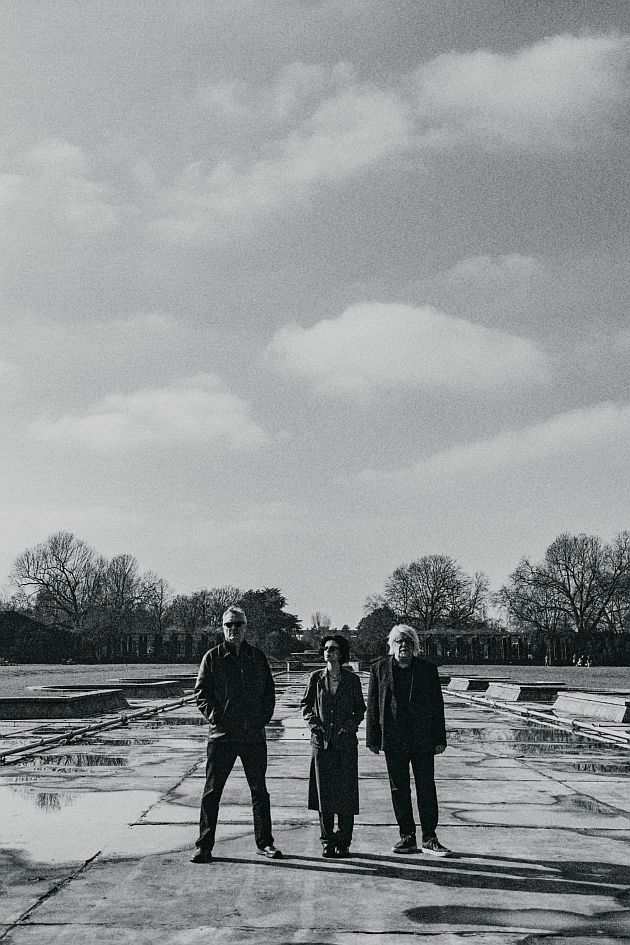
Pictures by Thomas Stelzmann




